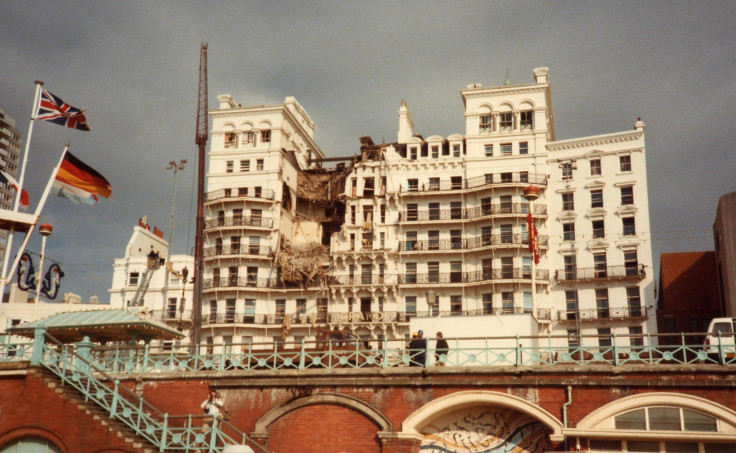Margaret Thatcher And The 1984 Brighton Bomb: When The IRA Almost Killed The Iron Lady

Former British Prime Minister Margaret Thatcher died Monday at the age of 87 in luxurious surroundings: a private suite at the Ritz Hotel in London.
But if things had gone a little differently, Thatcher would have lost her life at another hotel nearly 30 years ago, right in the middle of her tenure.
On Oct. 12, 1984, Thatcher was at the Brighton Grand Hotel on the south coast of England when an explosion ripped through the building’s façade, close to where she was staying. The bomb had been planted in Room 629 by Patrick Magee, a member of the Provisional Irish Republican Army.
The blast took place during the pre-dawn hours, but Thatcher was awake and working on a speech. Her hotel suite was damaged, but she escaped unscathed.
The perpetrator of this violent crime was targeting the prime minister and her Cabinet, all of whom were in Brighton for a Tory Party conference. No top-ranking members of the Cabinet were killed, but two officials and three wives of officials lost their lives on that Friday morning. Dozens more were wounded.
The tragic event was made even more unsettling by the IRA’s subsequent statement.
“Today we were unlucky, but remember, we only have to be lucky once,” it said. “You will have to be lucky always. Give Ireland peace and there will be no war.”
The Provos' terror campaign sought to force London to relinquish its claim to Northern Ireland. Their ultimate goal was the creation of a single socialist republic spanning the entire island of Eire.
The group finally agreed to lay down their arms in the 1998 Good Friday Agreement, but some pockets of sympathizers and fringe outfits remain unreconciled. Just last month, authorities in Northern Ireland foiled a plan to fire mortar bombs at a police station. The scheme was allegedly perpetrated by Irish nationalist militants.
But today’s sporadic incidents are nothing like they were three decades ago. The 1984 attack against Thatcher came during the Provisional IRA’s heyday, when it enjoyed support from many Catholics on the Six Counties of Ulster, Irish-Americans and sympathetic forces abroad like the Libyan regime of Moammar Gadhafi, the Palestine Liberation Organization and Basque separatists in Spain.
Thatcher was a staunch defender of Northern Ireland’s status as a British territory, and not only because she generally refused to compromise on issues of sovereignty. She also had a personal vendetta against Irish nationalists, since members of one group had murdered her good friend, Tory leader Airey Neave, shortly before she became prime minister in 1979.
Irish Republicans and their sympathizers condemned what they saw as Thatcher’s callousness when, in 1981, 10 Republican detainees, including Bobby Sands, died on hunger strike to protest condition of their imprisonment.
The day after the deadly bomb explosion in Brighton, Thatcher astounded the world by continuing on with her conference duties. She made sure that events continued according to schedule, despite the fact that some of her colleagues had been hospitalized or killed.
In a speech on Friday morning, she made only a few deft changes to her planned remarks in order to sound patriotic rather than partisan. “This attack has failed,” she said, according to the BBC. “All attempts to destroy democracy by terrorism will fail.”
The Brighton bomb perpetrator Magee was sentenced to life in prison, but he was released as part of the Good Friday Agreement and has since made efforts to promote reconciliation.
© Copyright IBTimes 2025. All rights reserved.






















